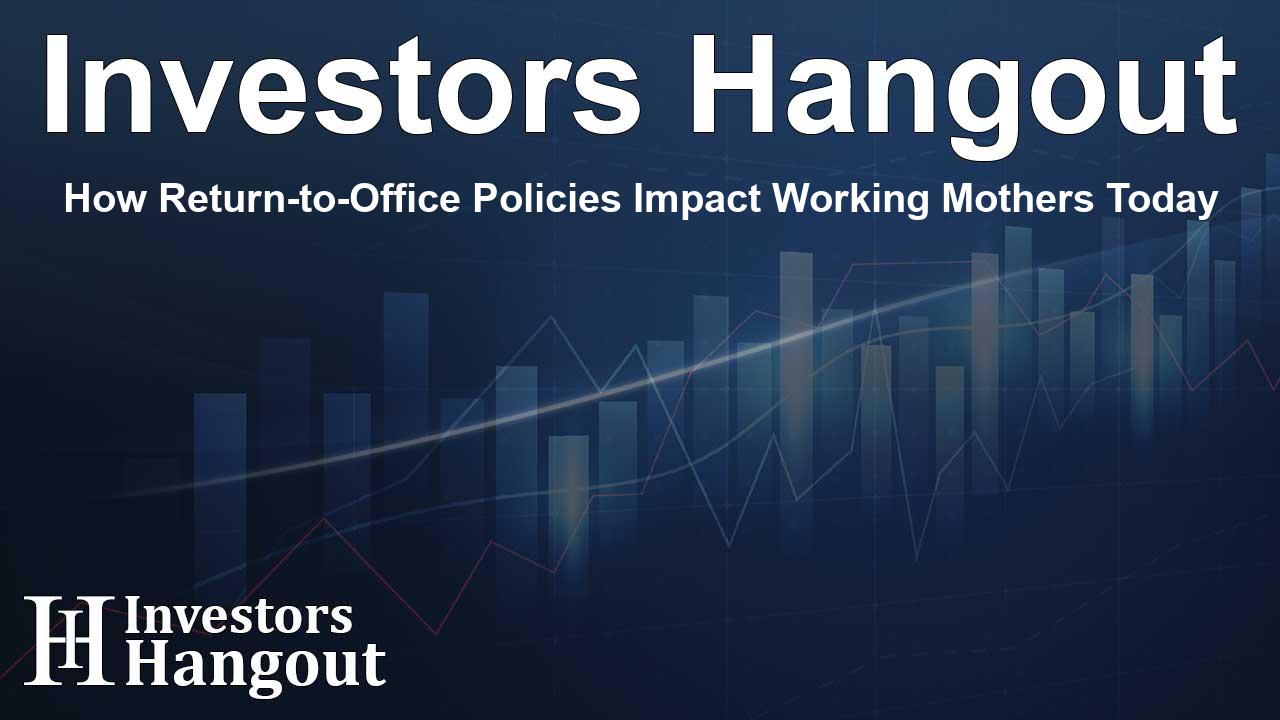How Return-to-Office Policies Impact Working Mothers Today

The Shift Back to Office Work and Its Consequences
Remote work provided a significant advantage to new mothers who wanted to balance their careers while spending time with their children. The ongoing trend of returning to physical office spaces, however, is threatening to erase the progress they've made, contributing to a challenging issue known as the 'Motherhood Penalty.'
Rise in Women Leaving the Workforce
Recent analyses have shown that mothers, particularly those with children under five, are facing an alarming trend in workforce participation. Many have found themselves leaving their jobs at unprecedented rates due to the pressures associated with returning to a traditional office environment. Statistics indicate that this demographic has experienced a significant decline in labor participation, highlighting the emotional struggle many mothers face between professional obligations and family responsibilities.
Commuting Disrupts Family Dynamics
The prospect of commuting during busy hours is daunting for many mothers. With a schedule that demands one to leave home early in the morning and return late in the evening, the allure of office work diminishes quickly. Consequently, around 212,000 women have chosen to exit the workforce, opting instead to prioritize family life over professional ambitions.
On-Site Work vs. Remote Work
While some careers, like nursing, necessitate physical presence, the pandemic underscored that numerous roles can be effectively handled remotely. Yet, the rigidity of recent return-to-office rules attempts to enforce outdated work models that don't accommodate the needs of working mothers today.
The Stay-at-Home Choice for Mothers
Interestingly, alongside the exodus of working mothers, there are those who willingly choose to remain at home. Movements such as #TradWife are gaining traction, advocating for women to embrace domestic roles. Many individuals promoting this movement feel they found traditional educational paths restrictive and unfulfilling, influencing their desire to stay home instead of pursuing careers.
Economic Realities Lead to Tough Decisions
Increasing childcare costs are a crucial factor compelling mothers to reconsider their employment status. Many women recognize that staying home can be more financially viable due to soaring costs and the tax structure that penalizes dual-income households. As a result, some mothers find themselves realizing that the cost of commuting and childcare outweighs the benefits of continuing to work.
The Long-Term Impact of Job Gaps
The implications of the 'Motherhood Penalty' stretch far beyond immediate job loss. Women who take extended breaks away from their careers may struggle to return, often facing significant hurdles as they attempt to re-enter the workforce. These gaps can hinder opportunities for high-paying jobs, forcing some to start from the bottom and navigate the corporate landscape anew, which is especially challenging when finances are tight.
Addressing the Needs of Working Mothers
The aggressive return-to-office policies many corporations are implementing have increasingly placed mothers in a precarious position, pressuring them to choose between their children and their careers. To foster a truly inclusive workplace environment, companies must recognize that remote work options can be an effective solution that accommodates the aspirations of working mothers. While some women may opt to stay at home, many desire the flexibility that remote work offers, allowing them to balance both family life and professional success.
Frequently Asked Questions
What is the 'Motherhood Penalty'?
The 'Motherhood Penalty' refers to the disadvantages mothers face in the workforce compared to their childless peers, including pay disparities and promotional opportunities.
How has the shift back to office work affected working mothers?
The shift back to office work has led many mothers to reassess their employment, resulting in significant job losses as they prioritize family time.
What is the #TradWife movement?
The #TradWife movement encourages women to embrace traditional homemaking roles, gaining popularity among some social media users.
Why are childcare costs a significant concern for mothers?
Skyrocketing childcare costs make it financially difficult for many mothers to justify returning to work, prompting some to stay home instead.
What challenges do job gaps present for mothers?
Job gaps can hinder mothers' chances of securing high-paying positions upon re-entering the workforce, as they may be seen as less competitive than peers who maintained continuous employment.
About The Author
Contact Dominic Sanders privately here. Or send an email with ATTN: Dominic Sanders as the subject to contact@investorshangout.com.
About Investors Hangout
Investors Hangout is a leading online stock forum for financial discussion and learning, offering a wide range of free tools and resources. It draws in traders of all levels, who exchange market knowledge, investigate trading tactics, and keep an eye on industry developments in real time. Featuring financial articles, stock message boards, quotes, charts, company profiles, and live news updates. Through cooperative learning and a wealth of informational resources, it helps users from novices creating their first portfolios to experts honing their techniques. Join Investors Hangout today: https://investorshangout.com/
The content of this article is based on factual, publicly available information and does not represent legal, financial, or investment advice. Investors Hangout does not offer financial advice, and the author is not a licensed financial advisor. Consult a qualified advisor before making any financial or investment decisions based on this article. This article should not be considered advice to purchase, sell, or hold any securities or other investments. If any of the material provided here is inaccurate, please contact us for corrections.
